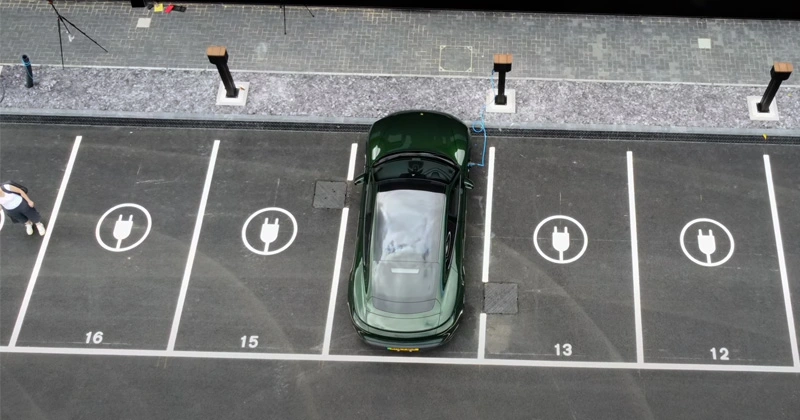As 2025 dawns, we reflect on a transformative year in the electric vehicle (EV) industry—a time when EVs transitioned from being a niche luxury to a mainstream transportation option. EV charging news captured the spotlight, underscoring the pivotal developments and growth that defined the year. In 2024, the global transportation landscape underwent dramatic shifts, with EV adoption surging to unprecedented levels. This marked a turning point for the industry, propelling it toward a future shaped by innovation and sustainability.
The past year was not only about record sales but also significant transitions. Global EV sales were projected to hit 17 million units, capturing roughly 20% of the total car market. From China leading with nearly 10 million units to Europe where one in four new cars were electric, and the U.S. experiencing a 20% surge in EV sales, the trajectory was clear. Even emerging markets like Southeast Asia and India were part of this expansive growth, illustrating the global embrace of electric mobility.
This rapid expansion has reshaped consumer behavior, influenced government policies, and driven strategic pivots within the industry. However, it wasn’t all smooth sailing; the year also saw notable industry shakeups, including the exit of key players and shifts in market strategies.
As we venture into 2025, let’s explore the most impactful stories from 2024 that are shaping the future of electric vehicles and the broader ecosystem of EV charging infrastructure.
Top Story #1: End of the Road: EV Industry Shake-Ups with Company Closures
Enel X North America Exits Market
The Closure of EVBox
2024 also saw EVBox, an Amsterdam-based provider of EV charging hardware, announce the closing of its operations in the U.S., Netherlands, and Germany. Engie, the French firm that acquired EVBox in 2017, announced it would liquidate the group after reporting losses exceeding €800 million since the acquisition. This decision left over 500,000 EVBox charging points and more than 20,000 business customers worldwide olxslot scrambling for alternatives, further emphasizing the vulnerabilities within the EV charging ecosystem.
EVA Global Files for Bankruptcy
EVA Global, a Finnish firm specializing in electric vehicle (EV) charging services, filed for bankruptcy following a thorough assessment of its financial status, operational hurdles, and the prevailing economic climate. Founded in 2017 by Dr. Niina Suuriniemi Hopper, EVA Global had grown to support over 320,000 charge points worldwide by 2022. The company was recognized for providing comprehensive support services to EV charging operators, including customer assistance and network management. https://appliedscienceconferences.com/about.html Its closure heightened concerns about the reliability of EV charging infrastructure and added pressure on remaining service providers.
Shell Recharge Discontinues Key Services
Adding to the industry’s upheaval, Shell Recharge (formerly known as Greenlots, which was acquired by Shell New Energies, a subsidiary of Royal Dutch Shell in 2019), announced in December 2024 that it would discontinue its Shell Sky Charge Point Management System (CPMS) services in North America by April 30, 2025. This system, crucial for many operators for managing pricing, scheduling, usage data, and maintenance of EV charging stations, will necessitate a transition to alternative platforms, such as those offered by Wevo Energy. With the shutdown looming, Wevo has stepped in, successfully migrating hundreds of EV chargers from Shell’s Sky CPMS to their system, exemplifying adaptability in the face of change.
The Importance of Open Standards
Top Story #2: Unifying the Charge: Advancing Interoperability in EV Charging
The Critical Role of Open Standards
In the rapidly evolving electric vehicle (EV) industry, software solutions that support open standards play a pivotal role by ensuring that various manufacturers, service providers, and charging stations can seamlessly communicate and operate together. This approach prevents a disjointed landscape where consumers might be confined to specific charging networks or face compatibility issues with different technologies. Open standard software solutions spur innovation by establishing a universal framework for advancements, significantly lowering the entry barriers for smaller entities and startups eager to contribute to the EV ecosystem. They also future-proof technological developments, facilitating swift updates and enhancements without the constraints of proprietary systems.
Interoperability: Key to Expanding EV Adoption
Interoperability is essential for providing EV drivers with the flexibility to access a diverse range of charging stations, regardless of their vehicle brand or charging service provider. This inclusivity is crucial for alleviating range anxiety and ensuring that drivers have access to a robust and convenient charging infrastructure. Without such interoperability, EV owners might find themselves needing multiple subscriptions or using various apps and cards to utilize different charging stations, creating unnecessary hurdles.
Fostering Collaboration for a Sustainable Charging Infrastructure
The push for open standard solutions and interoperability transcends enhancing the user experience; it is about building a sustainable and scalable charging infrastructure, particularly vital when charging operations are financed by taxpayers or rate-payers. As EV adoption accelerates, it’s imperative that all stakeholders—from automakers to utility companies to third-party networks—collaborate effectively. This cooperation is essential to meet the burgeoning demand for charging options and to further the shift towards a cleaner, more sustainable transportation ecosystem.
Spotlight on Strategic Collaborations: Wevo Energy and Eco-Movement
A prime example of industry innovation through collaboration is the August 2024 integration between Wevo and Eco-Movement, a global data platform for EV charging stations. This partnership aims to simplify how drivers locate and use charging stations across multiple networks and platforms, significantly boosting charger utilization.
This integration enhances the visibility and operability of EV charging facilities, offering charge point operators (CPOs) and EV charging solution providers a potent tool to increase traffic to their stations and improve business performance. Key benefits include enhanced visibility of station data and real-time updates, which provide drivers with accurate information on station availability and pricing. This not only maximizes the use of public charging stations but also ensures a more convenient and efficient charging experience for EV drivers.
By fostering such partnerships and prioritizing interoperability and open standards solutions, the EV charging industry can achieve greater scalability and efficiency, paving the way for a future where electric transportation is the norm.
Top Story #3: Rising Trend: Harnessing Solar Power for EV Charging
In 2024, an exciting trend emerged: the integration of solar power with electric vehicle (EV) charging. This sustainable approach is not only eco-friendly but also cost-effective, making it an attractive option for EV owners. The synergy between solar energy and EV charging has gained momentum, particularly with supportive legislative changes in California.
Legislative Support Boosts Solar-EV Integration
As of December 2024, California has taken significant legislative steps to encourage the use of solar energy in conjunction with EV charging infrastructure. Recent updates to Title 24 of the California Energy Code now mandate the installation of solar photovoltaic (PV) systems and battery storage in new residential and commercial buildings. These regulations aim to improve energy efficiency and align with the state’s ambitious renewable energy targets, demonstrating a strong commitment to environmental sustainability and innovation in infrastructure development.
Benefits of Solar-Powered EV Charging
By integrating solar panels with energy storage systems, homeowners and businesses can utilize renewable energy to charge their vehicles, decreasing dependence on the grid and lowering charging costs. This method not only leverages clean solar energy but also reduces fossil-fuel consumption, enhancing the eco-friendliness of EV charging.
As a proud member of the SolarEdge family, we are at the forefront of this movement, offering solutions that give EV drivers alternative energy sources for powering their vehicles. SolarEdge’s acquisition of our company strengthens our commitment to this cause. With the increased adoption of solar-powered EV charging solutions, individuals contribute to a more sustainable future while benefiting from reduced energy costs and increased energy independence.
Wevo Energy’s Innovative Contributions
Wevo Energy is also making significant strides by launching new capabilities that allow for the co-optimization of EV charging and solar generation at various sites(we should link to the blog post here). With these advancements, Wevo continues to push the boundaries of what’s possible in the integration of renewable energy solutions and electric vehicle infrastructure, setting a high standard for sustainability and technological innovation in the industry.
This growing trend highlights a crucial shift towards more sustainable energy practices, illustrating how innovative solutions can benefit both the environment and EV owners. As this technology continues to evolve and gain support, it paves the way for a more sustainable and efficient future in transportation and energy consumption.
Top Story #4: Accelerating Progress: The Boost from State and Utility Incentives
Federal Initiatives Fuel EV Infrastructure Expansion
The push to expand electric vehicle (EV) charging infrastructure in the United States has gained significant momentum through increased federal funding, state-level incentives, and substantial rebates from electric utility companies. The Biden-Harris Administration has played a pivotal role, allocating $521 million in August 2024 and $623 million in January 2024 to develop a national EV charging network. This funding, aimed at deploying thousands of charging ports across the U.S., forms part of the National Electric Vehicle Infrastructure (NEVI) program under the Bipartisan Infrastructure Law. NEVI, with a budget of $5 billion spread over five years starting in 2022, focuses on constructing fast-charging stations every 50 miles along major highways to facilitate convenient long-distance EV travel. This strategic placement is part of a broader goal to install at least 500,000 publicly available chargers by 2030.
Expanding Access Through the Charging and Fueling Infrastructure Program
Another crucial element of the Bipartisan Infrastructure Law is the Charging and Fueling Infrastructure (CFI) Discretionary Grant Program, which offers $2.5 billion over five years. This program aims to expand EV charging and alternative fuel infrastructure across the U.S., targeting both long-distance travel through corridor grants and local access through community grants in urban, rural, and underserved areas. The CFI program supports a range of projects, from Level 2 and DC fast chargers to hydrogen, propane, and natural gas fueling stations, enhancing equity and accelerating nationwide EV adoption.
State Programs and Incentives Enhance EV Adoption
On the state level, programs like New York’s EV Make Ready Program increased their incentive amounts in 2024, promoting the installation of both Level 2 and Direct Current Fast Charging stations. In California, the Communities in Charge initiative, backed by the California Energy Commission’s Clean Transportation Program and implemented by CALSTART, launched its third wave of funding in November 2024. With $30 million allocated, this initiative focuses on boosting EV accessibility in community-centric locations such as multi-family housing, schools, places of worship, nonprofits, and local government sites.
Legislative Support and Policy Changes
Further supporting EV infrastructure are updates to policies like the California Air Resources Board’s (CARB) Low Carbon Fuel Standard (LCFS), which now features increased carbon intensity reduction targets and expanded clean fuel incentives. Key changes include monitoring hydrogen supply, RNG deliverability, and fast-charging infrastructure. These changes are set to spur zero-emission vehicle growth and broader decarbonization efforts.
In response to the potential phase-out of the federal tax credit for EVs, California Governor Gavin Newsom announced plans to introduce a state-level incentive to sustain EV adoption momentum among California residents. This move aims to replace the federal tax credit, valued at up to $7,500, which has been pivotal in promoting nationwide EV adoption.
Broadening Electrification Beyond Personal Vehicles
The electrification movement extends beyond personal vehicles. The United States is seeing accelerated adoption of electric school buses, driven by federal funding and the recognized environmental and health benefits of replacing diesel buses. The Environmental Protection Agency (EPA) recently awarded nearly $900 million to 530 school districts, enabling the purchase of around 3,400 new buses, 92% of which are electric. Transitioning to electric school buses not only offers long-term savings but also reduces diesel emissions, thus improving air quality and benefiting children’s health and academic performance. Additionally, the EPA’s Clean Ports Program aims to transform U.S. ports towards zero-emission operations, further reducing diesel pollution and enhancing air quality in adjacent communities.
These comprehensive efforts underscore a national commitment to advancing electric mobility and making EV ownership increasingly accessible and convenient for all Americans. As initiatives and funding continue to evolve, the landscape for EV charging in the U.S. is poised for significant expansion and innovation.
Top Story #5: Diverse Drives: A Spectrum of New EV Models
2024: A Landmark Year for EV Diversity
The EV market experienced substantial growth in 2024, with a notable surge in the variety of models offered by automakers. This expansion catered to a broad spectrum of consumer preferences, fostering competition and driving innovation across the industry. The availability of diverse EV options was a significant win for consumers, as it ensured there were models suited to different lifestyles and needs.
Highlighting Key Models
Among the standout models introduced in 2024, the Chevrolet Blazer EV merged style with functionality, offering a sleek SUV design and an impressive range of up to 324 miles. This model targeted consumers looking for a stylish yet practical electric vehicle. In contrast, the Ford F-150 Lightning transformed the iconic F-150 pickup truck for the electric age, catering to traditional truck lovers ready to embrace sustainable technology. These vehicles demonstrated the auto industry’s strategy of integrating electric powertrains into a variety of vehicle types, thus broadening consumer choice.
A Market Responsive to Diverse Demands
The variety of EVs available in 2024 underscored the industry’s commitment to meeting diverse consumer demands. Whether drivers were in the market for compact city cars, family-friendly SUVs, or rugged pickup trucks, the expanded selection ensured that more people could transition to electric mobility without compromising style, functionality, or performance. This broad range of options played a crucial role in accelerating the adoption of electric vehicles, pushing forward the agenda for environmental sustainability.
The EV market’s rapid expansion in 2024 highlighted an evolving auto industry that was keen to provide solutions for every type of driver. By offering an array of models that catered to different preferences and needs, automakers not only enhanced consumer choice but also promoted a shift toward a more sustainable and diverse automotive landscape.
2025 and Beyond: Looking Ahead
2024: A Year of Triumphs and Challenges in the EV Industry
The EV industry experienced a transformative year in 2024, characterized by record-breaking sales, the shuttering of some companies, and groundbreaking advancements in charging and energy solutions. As EV adoption soared, the push for open standards, interoperability, and sustainable energy solutions became increasingly critical. Expanding consumer choices in EV models not only supported a greener future but also spurred competition and innovation across the sector. These developments have paved the way for a more resilient, sustainable, and accessible EV ecosystem.
Anticipating Trends in 2025
Looking forward to 2025, the EV market is poised for continued expansion, with forecasts predicting global EV sales could exceed 20 million units. This anticipated growth is expected to be fueled by ongoing enhancements in battery technology, which promise longer driving ranges, faster charging times, and reduced consumer costs. Innovations such as solid-state batteries and more efficient energy management systems are likely to decrease costs further and elevate vehicle performance.
Furthermore, the expansion of EV charging infrastructure, especially in underserved and urban areas, will be crucial in facilitating this growth. The integration of autonomous driving technology with electric vehicles will also influence the market, heralding a future where EVs are not only eco-friendly but also more intelligent and interconnected. With global governments ramping up emissions standards, 2025 could be a pivotal year for achieving mass-market EV adoption, bolstered by a robust, sustainable, and well-integrated ecosystem.
Wevo Energy at the Forefront
Wevo is dedicated to leading the charge in supporting this dynamic market. With innovative solutions and a focus on enhancing the EV charging experience, we are positioned to assist charge point operators and EV service providers in navigating the expanding demands of the industry. By advancing technologies and expanding our charging network, we aim to meet the growing needs of modern EV infrastructures and contribute to the broader adoption of clean energy vehicles.
Our team is committed to providing the necessary tools and technology to thrive in an increasingly competitive and eco-conscious market. If you’re looking to elevate your EV charging operations and take advantage of the latest in EV charging technology, reach out to us to discover how we can accelerate your success in electric mobility.


